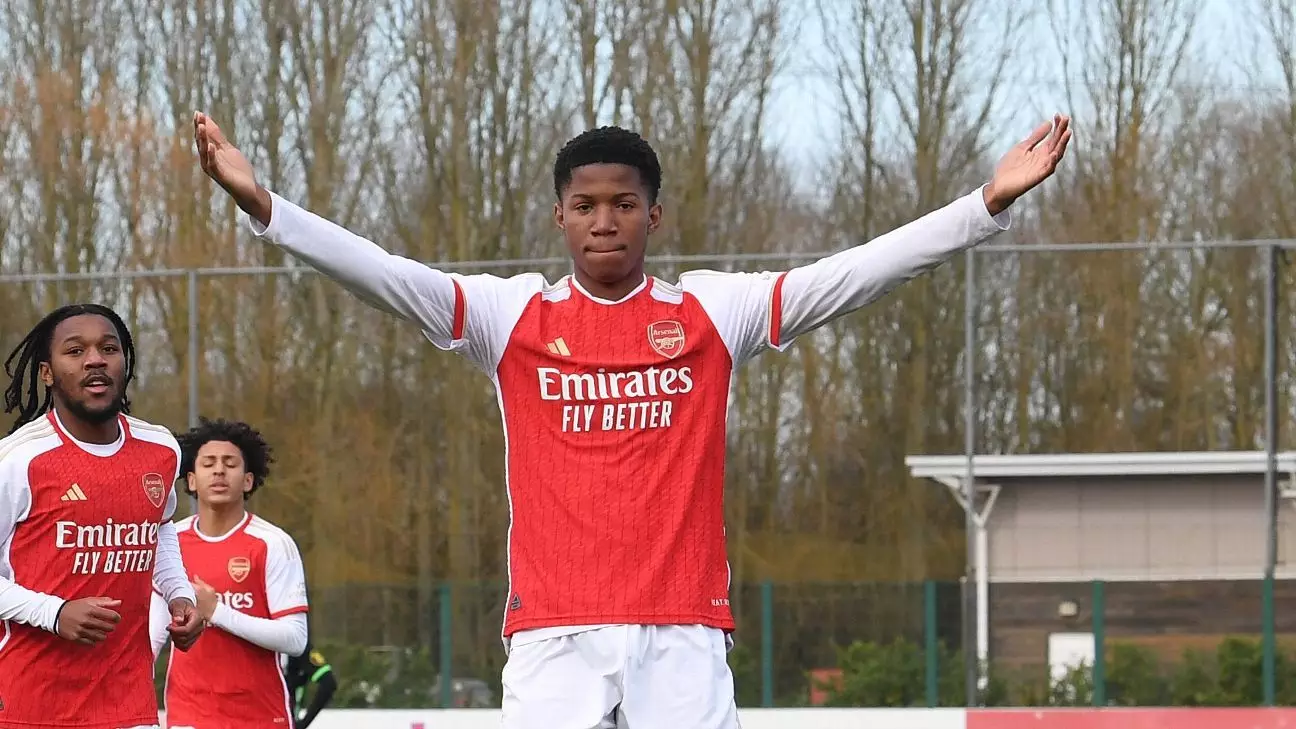At just 16 years old, Chido Obi-Martin has become one of the most talked-about talents in youth football. The teenage striker made headlines last season for his impressive goal-scoring feats while playing for Arsenal’s youth teams. His decision to reject a professional contract with the Gunners, in favor of joining their rivals Manchester United, has sent ripples through the football community. The transition was not immediate; it involved lengthy negotiations to finalize compensation due to his age and securing Premier League approval for the move. Now, as he steps into the vibrant atmosphere of Old Trafford, Obi-Martin aims to elevate his career, starting with the under-18 squad while harboring ambitions to break into the first team.
Social media has played a critical role in shaping the public’s perception of Obi-Martin’s prowess. His remarkable scoring record—where he netted ten goals in a ludicrous 14-3 victory over Liverpool’s U16 squad—places him squarely in the limelight. His youth career statistics are equally noteworthy, boasting an astonishing tally of 32 goals in just 18 appearances for Arsenal’s U18s. What makes his achievement even more impressive is that he often competed against older opponents, demonstrating a natural ability to thrive in challenging conditions.
Obi-Martin’s exceptional play earned him recognition on the international stage, as he was nominated for UEFA’s Team of the Tournament during the U17 European Championship with Denmark. His unique heritage—being born to a Danish mother and Nigerian father—grants him the flexibility of choosing to play for Denmark, Nigeria, or England as he matures. This multicultural background adds to his growing allure as a footballer, amplified by his association with the Elite Project Group agency, which represents stars such as Bukayo Saka and Jadon Sancho.
Standing at six feet two inches, Obi-Martin possesses a physical stature that gives him a distinctive edge over his peers. His height and strength enable him to dominate aerial duels and hold his own in one-on-one scenarios. Yet, physical advantage alone does not guarantee success in a sport as demanding as football. Observers point out that Obi-Martin has skillfully converted his physical traits into effective footballing attributes. Former scout Tor-Kristian Karlsen notes that the striker’s timing and off-the-ball movement are impeccable; he often evades defenders and utilizes deep passes to create scoring opportunities.
What truly sets Obi-Martin apart, however, is his clinical finishing ability. While many young strikers tend to rush their shots, Obi-Martin has mastered the art of remaining composed in front of goal. His knack for managing the rhythm of play allows him to execute shots with precision and confidence. This cool demeanor translates into his finishing technique—exhibiting a preference for gradually crafted shots rather than flamboyant attempts, which often catch goalkeepers by surprise.
Like many young prodigies, Obi-Martin’s path is not without hurdles. As he transitions to playing against older, more physically adept defenders, there are crucial aspects of his game that require fine-tuning. Karlsen emphasizes the importance of developing aerial technique and sophistication in tactical awareness—skills that will prove increasingly essential at higher levels of competition. Additionally, the teenage striker will need to adapt to playing with less possession, requiring him to enhance his ability to contribute as a link-up player in a more intricate team framework.
The example of Borussia Dortmund’s Youssoufa Moukoko serves as a reminder of the challenges facing young talents. Although Moukoko dazzled at youth level, translating that performance to the elite level has proven difficult. It underscores the fact that exceptional youth statistics don’t automatically translate to senior success.
Obi-Martin’s decision to switch clubs at such a young age raises questions about how well he will adapt to his new environment. Manchester United has a rich history of nurturing young talent, boasting a lineage of successful forwards like Marcus Rashford and Wayne Rooney. The presence of figures like Ruud van Nistelrooy in the club’s coaching staff adds an exciting facet to the potential growth of Obi-Martin, who will now have the chance to learn from one of the game’s prolific goal scorers.
As he prepares to make his mark at Manchester United, all eyes will be on Obi-Martin. The football world is keenly watching how he capitalizes on this new chapter in his burgeoning career and whether he lives up to the immense promise he has displayed thus far. With the right guidance and continued hard work, there are already hints that he could become a crucial player in the upcoming seasons, turning potential into tangible achievements as he carves out his own legacy in football.

